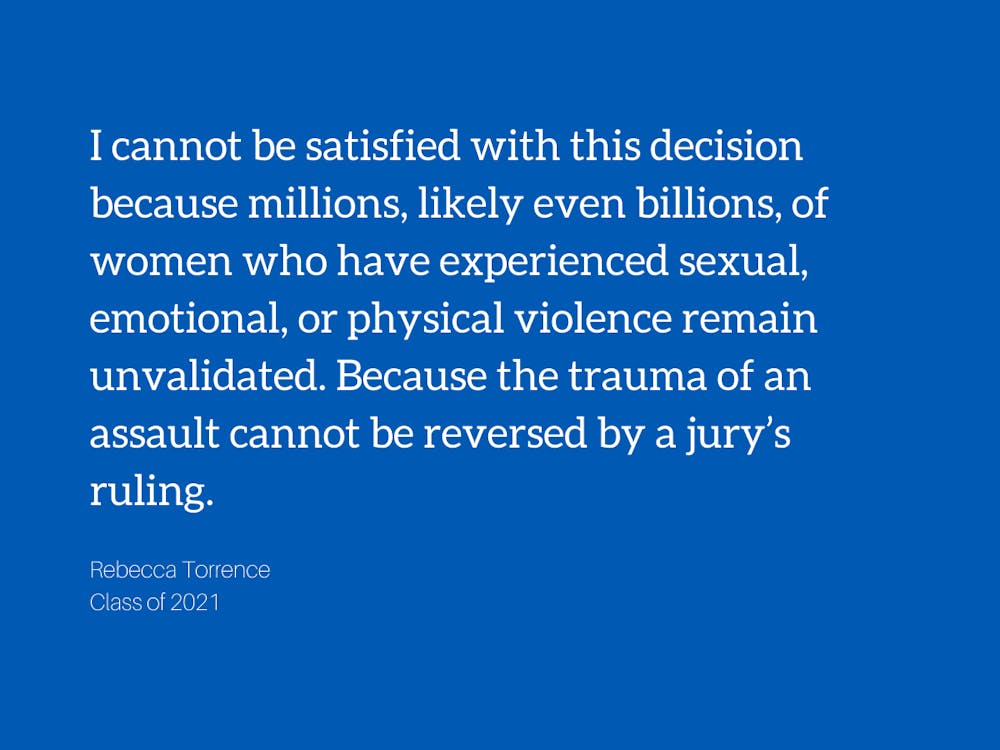I’ll remember the moment I got the notification of Harvey Weinstein’s conviction for a long time. This past Monday, February 24, Weinstein was charged with one count of third-degree rape and another count of first-degree criminal sexual assault. First shock, then relief washed over me as I realized that Weinstein will finally be sent to prison, and remain there for up to 29 years. Finally, the legal system chose to believe women.
So why, after reading the news, did I still feel so unsettled?
In what many news outlets have chosen to call a “watershed” moment, Weinstein’s conviction is no doubt a huge victory for the #MeToo movement. Justifiably so—the movement kicked off when the first accusations against Weinstein surfaced in October 2017. But the fight doesn’t end with his conviction.
Two of Weinstein’s victims had their stories validated to the world. 98 others did not.
I cannot be satisfied with this decision because millions, likely even billions, of women who have experienced sexual, emotional, or physical violence remain unvalidated. Because the trauma of an assault cannot be reversed by a jury’s ruling. Because, while Weinstein was convicted under two charges, he was acquitted on three other counts, including two counts of sexual predation, the most serious of the charges. Is that fact that these women were believed at all supposed to be enough?
Despite all of the progress we’ve seen since 2017, I have been made to feel unsafe by dozens of men throughout my life, and I will feel unsafe around dozens more. That’s not a prediction. That’s a fact.
Two weekends ago, I took a trip to Northern Morocco with other students living in Spain for the semester. I was excited to walk through the historic medina quarters of each city, to haggle with local street vendors, to try Moroccan food, and to learn a bit more about a culture I had neglected to explore for so long. I was also aware that I was entering the country as a tourist, armed with biases and cultural values that might conflict with the values I was to encounter there. But I was determined to set those judgments aside.
Little did I know it would not be my biases to ruin the trip for me. Whether or not the experiences I had were reflective of Moroccan culture, they were experiences I had. And I cannot and will not justify them.
It was as if years of the sexual violence back at home had been condensed into three days. I saw men whisper in my friends’ ears in the street, scream “come f*** me” in front of our hotel, attempt to lead my friends down dark alleys, and grope female students in the club without exchanging a single word. I walked the streets with dread, clutching my friends’ hands, praying to be left alone. What should’ve been a fun vacation had turned into a traumatizing struggle for safety.
I am angry that no man will ever be able to understand what that is like. And I am angry that so many women—black and brown women, transgender women, women with disabilities, women in sex work, and homeless women, to name a few—have even more reason to be afraid than I do.
And this doesn’t just happen to women, either. Genderqueer and gender-nonconforming individuals report rates of sexual assault similar and sometimes even higher to those reported by women. Moreover, an estimated one in ten rape victims are male. These assaults may not be dependent on the tradition of dehumanizing women, but they are assaults nonetheless.
This is our culture. Yes, that culture is changing. But as Duke senior Liddy Grantland wrote so eloquently in her latest column, it remains “a culture marred by sexual violence,” marked by “fear, shame and horror.” This culture has conditioned me to tense up whenever I notice a man I don’t know looking at me, to feel my stomach drop when men yell at me in passing cars, and to always glance over my shoulder when walking alone to make sure I’m not being followed.
These instincts won’t go away, and I don’t want them to. Every so often, there is a man who proves to me once more that my fear is justified.
I have been “accidentally” and purposefully touched without my consent, I have been catcalled, I have been followed, I have been objectified for everything my body is and everything it is not, and I have been immobilized by the eyes, bodies, and words of men. These men have been strangers, and they have been men I chose to trust. And I have seen and continue to see women who bear the scars of gender violence in all its insidious forms which may fade but will never disappear.
Of course I’m angry. My anger is the only power I have left.
We are not done. We are not done until no man gives a woman a reason to be afraid simply because she is a woman.
And we cannot combat the fear of sexual violence merely with the fear of retribution. As Rebecca Solnit of the New York Times put it, the society we must strive to create is “a society where the desire and entitlement to commit sexual violence wither away, not out of fear but out of respect for the rights and humanity of victims.”
Weinstein’s conviction marks the biggest step towards that society in some time. But we still have miles to go.
If my anger must be my only power, it’s a good thing I’m furious.
Rebecca Torrence is a Trinity junior. Her column runs on alternate Fridays.
Get The Chronicle straight to your inbox
Signup for our weekly newsletter. Cancel at any time.

